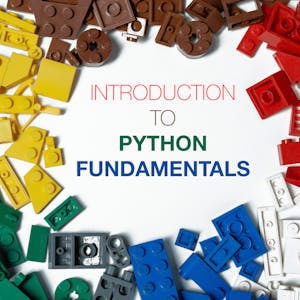Introduction to Python Fundamentals is a comprehensive course offered by the University of Colorado Boulder, designed for individuals with little or no programming experience. The course aims to equip learners with the foundational knowledge of programming in Python, with a focus on using Python as a tool to work with data.
Throughout this course, students will delve into the world of programming languages, with Python as the primary example. The curriculum covers essential topics such as variables, basic data types, input/output, and flow controls, allowing participants to build simple Python programs. The self-paced nature of the course ensures that students can learn at their own comfortable speed.
Embark on a fulfilling journey into Python programming and unlock the potential to work with data through this engaging course.
Certificate Available ✔
Get Started / More Info
Dive into the Introduction to Python Fundamentals course that encompasses four modules. Module 1 introduces Python programming, Module 2 delves into variables and operations, Module 3 covers flow control with branching, and Module 4 focuses on flow control with repetition. Each module provides a comprehensive learning experience to equip you with essential programming skills in Python.
Module 1: Hello, Python
Module 1 offers an overview of the Python programming environment and introduces learners to the basic concepts of Python. Participants will gain hands-on experience in using variables, input/output, and flow controls to build simple Python programs.
Module 2: Variables and Operations
Module 2 delves into the fundamentals of variables and operations in Python. Participants will gain a solid understanding of different types of variables, arithmetic operations, and relational operations. This module equips learners with the skills to manipulate data effectively using Python.
Module 3: Flow Control - Branching
In Module 3, learners will explore flow control with a focus on branching and if statements. The module covers multiple branches and decision trees, providing a comprehensive understanding of how to control the flow of a program based on conditions. Participants will gain the skills to make informed decisions within their programs.
Module 4: Flow Control - Repetition
Module 4 focuses on the necessity of repetitions in programming. Participants will learn about condition-based and count-based repetition, as well as the usage of continue and break statements. This module empowers learners to create efficient and dynamic programs through effective control of program repetitions.
Clinical Data Science is a six-course specialization offering hands-on experience in using electronic health records and informatics tools to perform clinical data...
This specialization explores visualization in the data science workflow, using Tableau for interactive visual analytics, data manipulation, and dashboard creation....
Join the Data Science Challenge to compete in a coding challenge, building a prediction model using Python and Jupyter Notebooks.
Serverless Data Processing with Dataflow: Foundations is a comprehensive introduction to Apache Beam, Dataflow, and the Beam Portability framework, enabling learners...